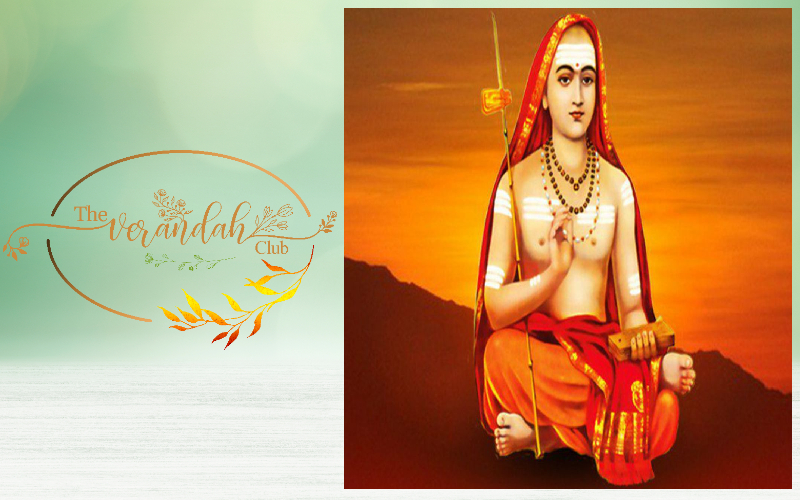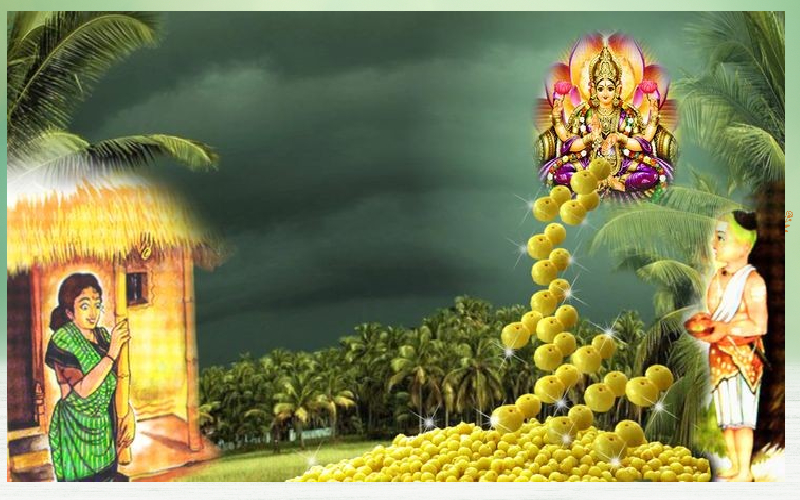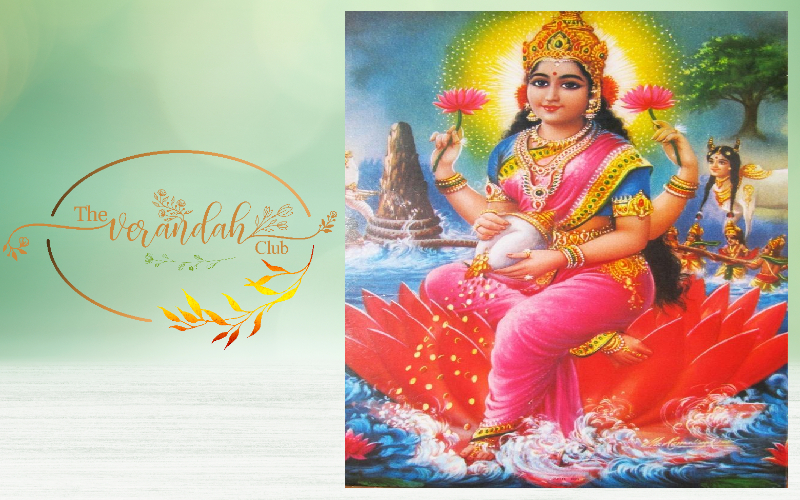The Beautiful Story of Poor Woman’s Devotion:

Ādi Śaṅkarācāryā was born in Kāladi in 8th century when Nir-ishvara Vāda was at its peak. Animal sacrifices were furious and dreaded, internecine fights between the worshippers of Sakthi, Surya, Ganapati, Vishnu, and Siva took ugly turn, and the cults lost their mutual identity and understanding. It was Śaṅkarācāryā who cemented the bonds among all the five cults by instituting Pañcāyatana puja incorporating all the five Gods and making everybody understand that worship of one God amounts to worship of all by Advaita Siddhānta.
One day, at the age of 5, Śaṅkarācāryā was going to few houses to take Bhikṣā. He came across a hut and asked for Bhikṣā (food). The woman inside the house was embarrassed as a saint has come to her house for food but she is so poor that nothing was available in her house. She searched all the places and finally found an old Āmlā fruit (‘Nelli kani’ in Tamil). The poor woman was feeling shy to give only this little Āmlā fruit to Śaṅkarā but she had immense devotion and does not want to send the saint who came to her house empty handed. She offered the Āmlā fruit in the bowl of Lord Śaṅkarācāryā.

Śaṅkarācāryā realized the woman’s devotion irrespective of being poor. He immediately started singing twenty-one slokas praising Goddess Mahālakṣmī, praying her to bless the poor woman by driving her poverty and granting her riches.
As you sow, so you reap.
The Goddess replied that the lady has not done any good deeds (helping others in charity) in her previous birth. So, she doesn't deserve riches and is destined to suffer in poverty. Ādi Śaṅkarācāryā accepted it but said that though the poor lady didn't do any good deeds in previous birth, in this birth, she has such a kind heart that irrespective of being poor, she gave this little Āmlā fruit to me and this good deed alone is enough to bless her with all prosperity.

Goddess Mahālakṣmī’s Grace:
Listening to Śaṅkarācāryā's beautiful Stotra and his argument that the poor woman must be blessed for her good deed in this birth (Offering of little Āmlā fruit), Goddess Mahālakṣmī was moved. Here comes the greatness of this Goddess. She really is for devotion and purity of heart. If we always involve in good deeds, always chanting Goddess’ name, we will surely be blessed by Mahālakṣmī.
As Śaṅkarācāryā was singing ‘Śrīkanakadhārāstotraṁ’, Mahālakṣmī showered Golden Āmlā fruits like rain in front of the poor woman’s hut. This event occurred at this place, now popularly known as ‘Swarnatthu Mana’ is in Punnorkode, Pazhamthottam situated 16 Kms from Āluva and 23 Kms from Kāladi.
How beautiful is the devotion of the poor lady and how great is the saint Ādi Śaṅkarācāryā who sang in praise of Mahālakṣmī and beyond all this, how graceful is Goddess Mahālakṣmī.
Ādi Śaṅkarācāryā has sung this ‘Śrīkanakadhārāstotraṁ’ for welfare of everyone who is suffering their past karma and suffering in poverty.
Advaita Siddhānta of Śrī Śaṅkarācāryā, Śrī Mahādevī seated on the Hṛdaya (chest) of Śrī Viśnu carries all the power of him coupled with her Ṣakti.
Śaṅkarācāryā while reciting ‘Śrīkanakadhārāstotraṁ’ brought out alike the greatness and glory of Viśnu ventilated that such divinity was being presided by Śrī Lakṣmī.
We should sing ‘Śrīkanakadhārāstotraṁ’ every day or at least listen to it with pure devotion on Goddess Mahālakṣmī offering flowers, milk or water in a glass, or dry grapes with honey and after prayers have it as Prasāda.
Mahālakṣmī is the goddess who will bless us with wealth when we worship her. At the same time , she is truly a Goddess of mercy. She protects us from evil forces and helps us walk in the path of righteousness.
The easiest way to gain her blessings is by involving ourselves in little good deeds. Help your friends, relatives or any needy, as per your ability. With whatever little money you have try to get some clothes for poor children and give them from your own hands. Don't be too liberal but give the little you can for others education, food, and clothing. Don’t do it to show off what you have done or to earn praise and prize.

Kanakadhārā Homaṁ
Kanakadhārā Homaṁ is a very rare and effective Homaṁ for attaining all good fortunes in life. This Homaṁ is done by reciting ‘Śrīkanakadhārāstotraṁ’ which consists of 21 Ślokā-s, the rarest stotraṁ sang by Śaṅkarācāryā for removing the bad effects of past karmas and deficiency. Performing this Homaṁ offers Aṣtasiddhi and Navaniddhi.
Reciting ‘Śrīkanakadhārāstotraṁ’ while performing this Homaṁ surely banishes poverty and very useful for those having monetary issues. The individual who wants immediate relief from financial problems can choose this Kanakadhārā Homaṁ. Conducting Kanakadhārā Homaṁ can doubtlessly bring all good luck.
The benefits of Kanakadhārā Homaṁ are as follows –
1. Helps in clearing financial obstacles, and in making huge earnings from business.
2. This Homaṁ is performed to keep fortune by your side.
3. This Homaṁ makes people successful and well-off.
4. Kanakadhārā Homaṁ is very effective to get desired result when performed with complete faith and fidelity.
5. Performing Kanakadhārā Homaṁ helps in pay out debt or getting the wealth back.
6. Kanakadhārā Pūjā and Homaṁ offers huge happiness, victory, and imparts abundant prosperity.
The Akṣaya Tṛtīya day, carries Lord Vishnu’s blessings. Any pious deed performed on this day is carried forth by the doer and they can reap eternal benefits from it. This day is more auspicious to perform Kanakadhārā Homaṁ to get rid of the bad effects of Karma.
It is said that it was on the day of Akṣaya Tṛtīya that the child Ādi Śaṅkarā reached the residence of the brahmin seeking alms. Doing charity on the day of Akṣaya Tṛtīya definitely brings never-diminishing good luck and success.
There are references in ancient literatures regarding the importance of doing charity on Akṣaya Tṛtīya. They also advise us to give our favorite things to others instead of spending money for buying favorite things and keeping it for ourselves. It is important to know that people who pray to Goddess Mahālakṣmī on this day by serving the poor who have no food to eat and dress to wear, also get the grace of Mātā. As we would have heard the Sanskrit quote, “Nara Sevā Nārayaṇa Sevā,” which literally means “Service to Humanity is Service to God.”
At Śrī Mahālakṣmī Pīdaṁ, Kodaikanal, on the auspicious Akṣaya Tṛtīya day Kanakadhārā Homaṁ is being performed every year by reciting ‘Śrīkanakadhārāstotraṁ’ 108 times. This Homaṁ is performed by sacrificing lotus flower dipped in honey and ghee to Agni. The individual who wants immediate relief from financial crisis can perform this Homaṁ on their Jaṅma Nakṣatra.
NEXT ARTICLE